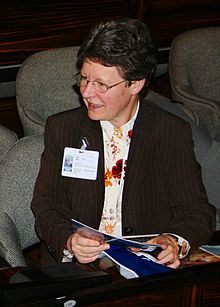Jocelyn Bell Burnell
Dame Susan Jocelyn Bell Burnell (* 15. July 1943 in Belfast , Northern Ireland as Susan Jocelyn Bell ) is a British radio astronomer . In 1967 she and Antony Hewish were the first to discover a neutron star in the form of the first pulsar observed.
Life
Jocelyn Bell studied at the University of Glasgow and after graduating in 1965 moved to Antony Hewish at Churchill College in Cambridge . When evaluating the data of the 1967 completed radio telescope arrays ( Interplanetary Scintillation Array ) in the Mullard Radio Astronomy Observatory (MRAO) at Cambridge she remembered some signals on which they cosmic objects zuordnete - the discovery of the first pulsar PSR B1919 + 21 .
After marrying government official Martin Burnell in 1968, a year before her PhD , she moved to the Mullard Space Science Laboratory in Southampton to be around her husband. From 1991 to 2001 she was professor of physics at the Open University in England .
Bell Burnell was not included in the award of the 1974 Nobel Prize in Physics to Anthony Hewish and Martin Ryle , which led to heated controversy among the scientific community. In contrast, a year earlier (1973) she had been awarded the Michelson Medal of the Franklin Institute in Philadelphia together with Hewish . A member of the Royal Society since 2003 , Bell Burnell was honored by Queen Elizabeth II as Dame Commander of the Order of the British Empire in June 2007 and thus elevated to the rank of personal nobility . In 2018 she received the Special Breakthrough Prize in Fundamental Physics , which recognized her discovery of the pulsar PSR B1919 + 21 and her lifelong inspirational and scientific leadership. She wants to donate the prize money to women, ethnic minorities and refugees who are underrepresented as physics scholars.
Burnell was President of the Royal Society of Edinburgh from 2014 to 2018 .
Awards
- Michelson Medal , Franklin Institute , Philadelphia, 1973
- J. Robert Oppenheimer Memorial Prize, Center for Theoretical Studies, Miami, 1978
- Beatrice M. Tinsley Prize , American Astronomical Society , 1987
- Herschel Medal , Royal Astronomical Society , London, 1989
- Jansky Award, National Radio Astronomy Observatory, 1995
- Order of the British Empire (CBE) for services to astronomy, 1999
- Magellanic Premium , 2000
- Member of the Royal Society (FRS), 2003
- Member of the National Academy of Sciences , 2005
- Honorary doctorate from Harvard University (USA), 2007
- Order of the British Empire (DBE) for services to astronomy, 2007
- Honorary Doctorate from Durham University (UK), 2007
- President of the UK Institute of Physics , 2008
- Honorary Member of the Royal Irish Academy , 2012
- Royal Medal , 2015
- Member of the American Philosophical Society , 2016
- Member of the American Academy of Arts and Sciences , 2018
- Grande médaille de l'Académie des sciences , 2018
- Special Fundamental Physics Prize , 2018
additional
- She was interviewed the BBC telecast Beautiful Minds .
- She is interviewed in the documentary Break the Science Barrier by evolutionary biologist Richard Dawkins and her enormous contribution to science is recognized.
- In the science fiction series "Orville", a ship, the "USS Burnell", is named in her honor.
literature
- Sally Montgomery, Louise Hickey (Ill.): Irish Scientists and Inventors: Jocelyn Bell Burnell . Blackstaff Press Ltd, 1995, ISBN 0-85640-554-X (English)
- Maurice Riordan, Jocelyn Bell Burnell: Dark Matter: Poems of Space . Calouste Gulbenkian Foundation, 2008, ISBN 978-1-903080-10-8 (English)
Web links
- Jocelyn Bell Burnell in the AcademiaNet database of renowned women scientists
- Article on the history of the discovery of the first pulsar - " Quasars wanted, pulsars found ", by Stefan Oldenburg
Individual evidence
- ↑ Jane J. Lee: 6 Women Scientists Who Were Snubbed Due to Sexism. In: National Geographic, May 19, 2013.
- ↑ Breakthrough Prize - Winners of the 2019 Breakthrough Prize in Life Sciences, Fundamental Physics and Mathematics Announced. October 17, 2018, accessed March 3, 2020 .
- ↑ DER SPIEGEL: England: Astrophysicist Jocelyn Bell Burnell donates 2.5 million euros - DER SPIEGEL - Panorama. September 6, 2018, accessed March 3, 2020 .
- ^ The Magellanic Premium of the American Philosophical Society , website of the APS . Retrieved October 29, 2019.
| personal data | |
|---|---|
| SURNAME | Bell Burnell, Jocelyn |
| ALTERNATIVE NAMES | Bell Burnell, Lady Susan Jocelyn; Bell, Susan Jocelyn (maiden name) |
| BRIEF DESCRIPTION | British radio astronomer |
| DATE OF BIRTH | July 15, 1943 |
| PLACE OF BIRTH | Belfast , Northern Ireland |


